Cameras for cycling to capture a first-person perspective of your trips
The best camera for cycling can give sportsmen and hobbyists an amazing experience of capturing their rides without worrying about the safety of the device. Whether you’re into mountain biking or competitive racing, this small but powerful thing, attached to a helmet or handlebars, will delight you with eye-catching, high-quality dynamic footage.
This article contains cameras for every budget; the cost of cameras in this list is from $90 to $500. I have analyzed the best models that the current market offers so that you can find your ideal device – an action camera or an adventure camera with a compact size, light weight, and high level of protection, producing super clear shots.
No matter what type of camera for cyclists you’re looking for – helmet mount, handlebar mount, or seat mount – this article will help you find an ideal option. When selecting models for this guide, I took into account such critical parameters as image resolution, built-in optical stabilization, and helmet mount, as well as decent battery life. In the article, you will find cameras that are crammed with all sorts of features, as well as simpler devices at a lower cost.
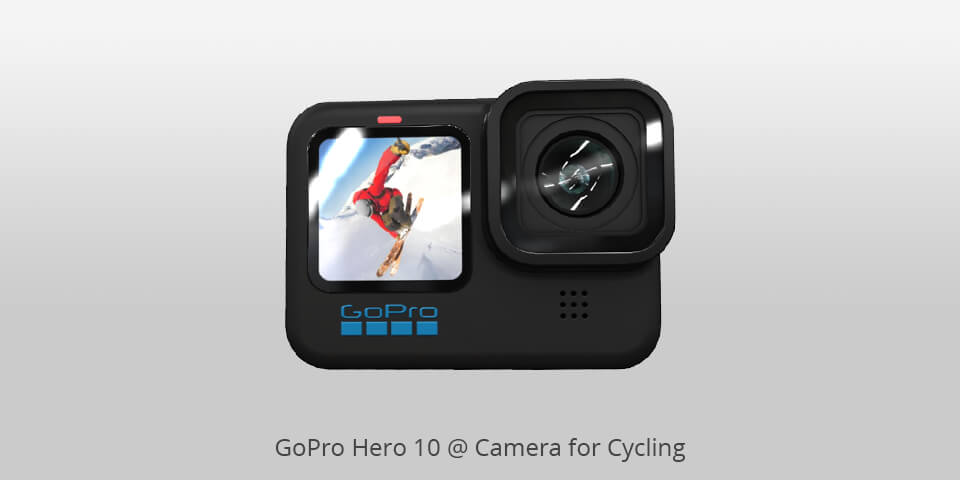
Max video resolution: 5.3K at 60fps | Stabilization: HyperSmooth 4.0 | Battery life: 1720mAh (estimated 1-2 hours recording) | Dimensions: 3.2 x 4.8 x 9.4 inches | Weight: 15.2 ounces
Users deservedly consider the GoPro Hero-10, equipped with Hyper-Smooth-based stabilization, to be one of the best cycling cameras. Thanks to this, you get super clear footage of your dynamic ride even without any gimbal stabilizers. The front of this GoPro camera is equipped with a color LCD screen, so you no longer need to rack your brains on how to film both yourself and the trip, which will greatly delight sports vloggers. On top of that, you can benefit from a larger rear screen, improved resolution, and image stabilization options.
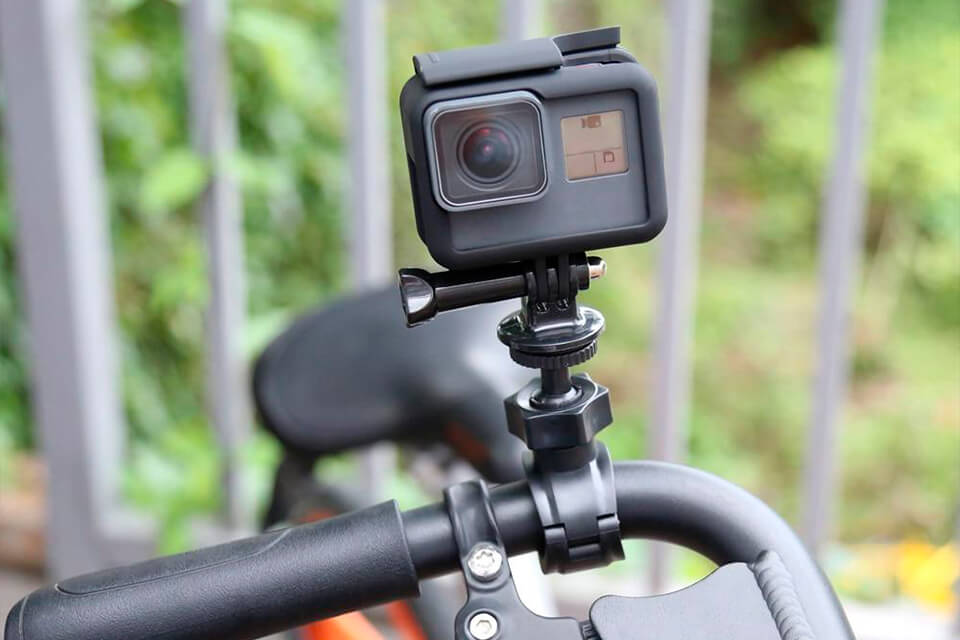
Thanks to the GP2 processor, the camera has a faster UI, doubled frame rate, and perhaps the best stabilization mechanism that an action camera has ever been equipped with. Due to all these features, you can now enjoy resolutions as high as 5.3K at 60fps. For 4K resolution, this figure is 120 frames per second, and for 1080P – 240. In terms of images, you can count up to 23 MP. Battery autonomy is dependent on use in dim and dark lighting and can range from 1 to 32 hours. That being said, footage captured in such dark conditions is truly stunning and clear.
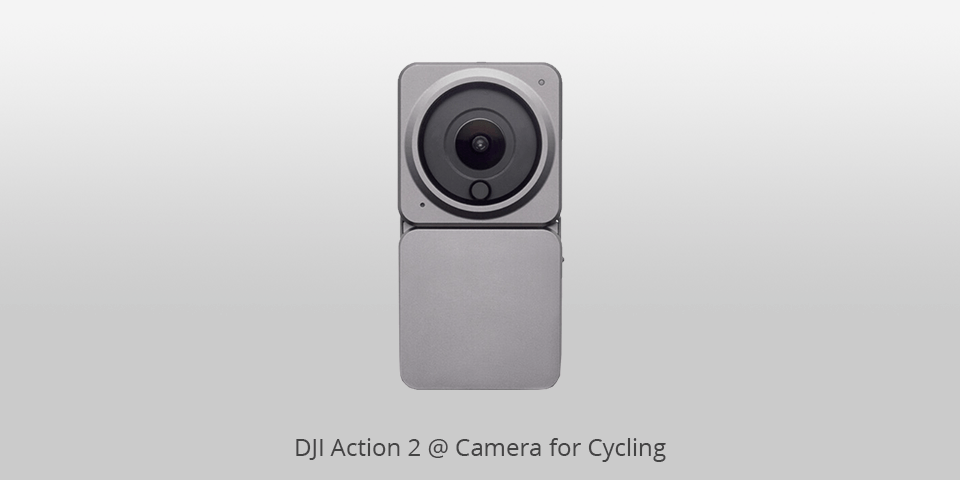
Max video resolution: 4K 120p | Stabilization: RockSteady 2.0 | Battery life: 580 mAh (1-2 hours) | Dimensions: 39 x 39 x 22.3mm | Weight: 56g
This camera for biking is an unusual representative of GoPro. It looks like a small cuboid with a magnetic mount, designed to be the centerpiece of a modular system. The video it produces is amazing in terms of quality and clarity, and when it comes to numbers, it’s 4K at 120 fps for super slow motion. One of its advantages is its low weight, which makes it possible to install it where you want.
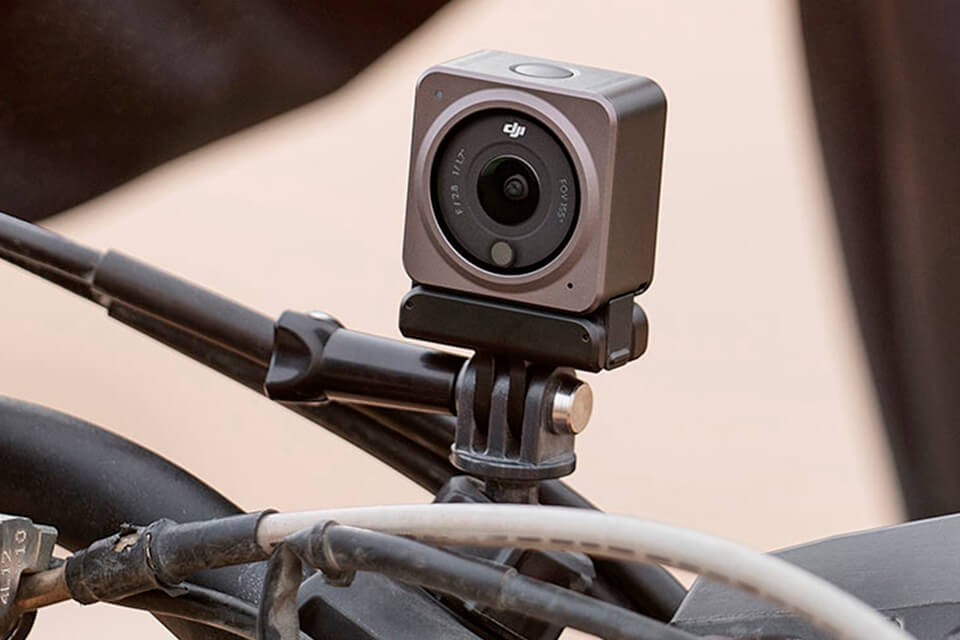
Control is via an OLED touch screen or the Mimo app. Users also comment on the amazing battery life. According to the manufacturer, you can count on more than two hours of continuous shooting, provided that the stabilization functions are disabled.
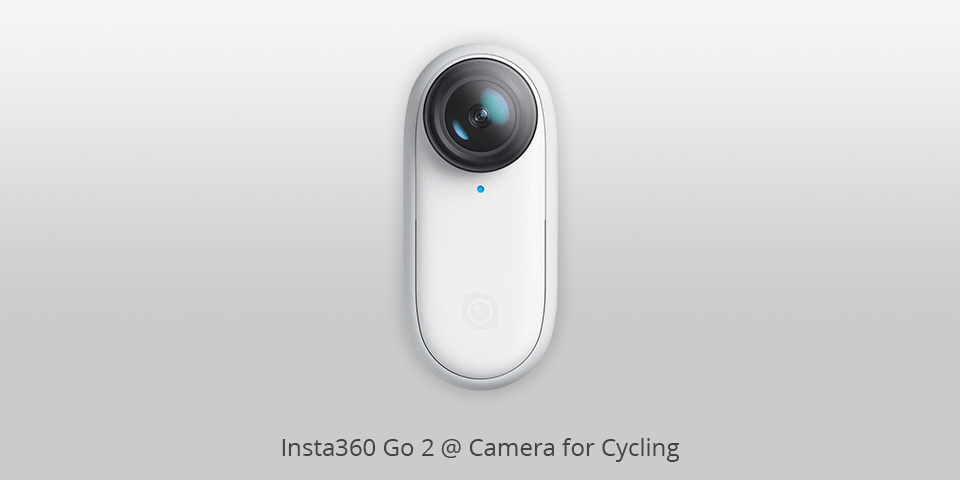
Max video resolution: 1440p@50fps, 30fps | Stabilization: FlowState | Battery life: 210mAh (up to 150 minutes) | Dimensions: 2.08 x 0.93 x 0.81 inches | Weight: 0.917 ounces
This tiny cycle camera surprises with its compactness among its competitors in the market. At the same time, the features and characteristics that it managed to fit into itself are simply amazing - 1440p resolution with frame rates up to 50p, FlowState stabilization, and even HDR. All this gives you an amazing user experience while recording and cycling.
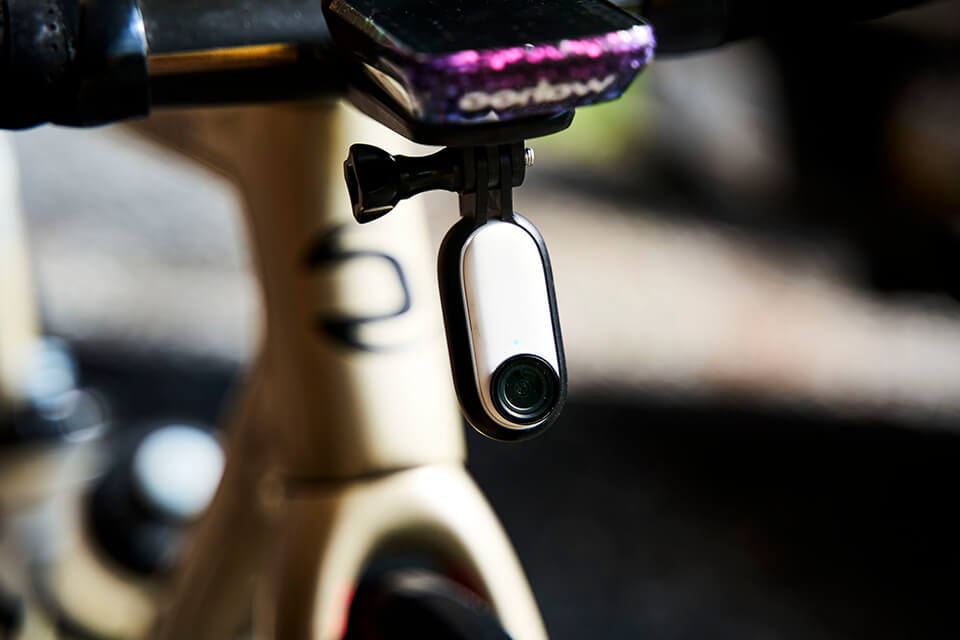
In addition to the device itself, manufacturers also make special helmet mounts. Special attention deserves an increased level of waterproofing of this camera – now you can not worry if you get caught in the pouring rain while riding. However, I recommend always taking a charging case with you, as the battery is still rather weak.
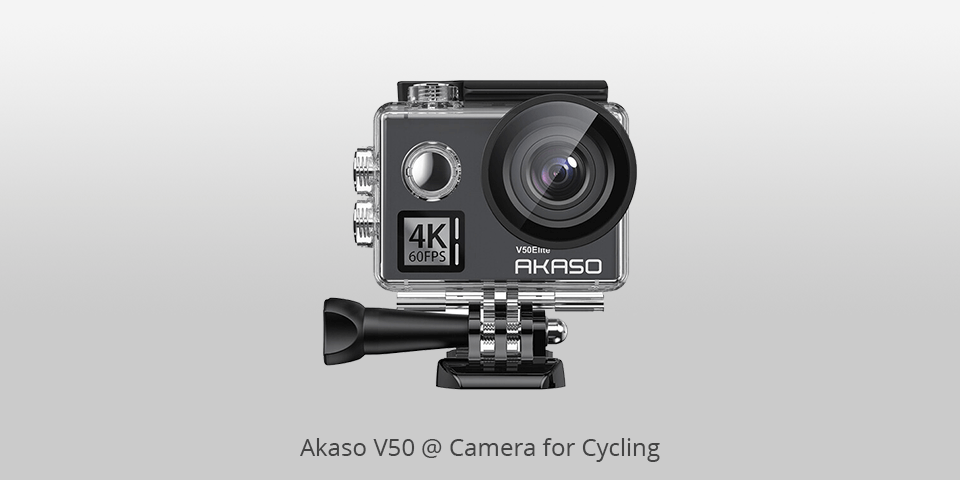
Max video resolution: 4K/60fps | Stabilization: built-in EIS | Battery life: two 1100mAh batteries | Dimensions: 2.36 x 1.57 x 1.18 inches | Weight: 1.19 pounds
This affordable helmet camera is a real godsend for all cyclists looking to capture their rides. It comes with decent specs for the price – 20 MP resolution for photos, 4K, and 60fps for video. What’s more, the device is equipped with a 2-inch high-sensitivity IPS touch screen. All this makes viewing photos and videos, adjusting settings, and managing the shooting process even easier and hassle-free.
The smoothness and stability of the received videos are at their best thanks to advanced EIS technology. What’s more, it’s easy to connect your best camera for cycling to your phone thanks to the built-in 2.4GHz Wi-Fi connection. This will make it even easier to manage it in the iSmart Pro plus app.
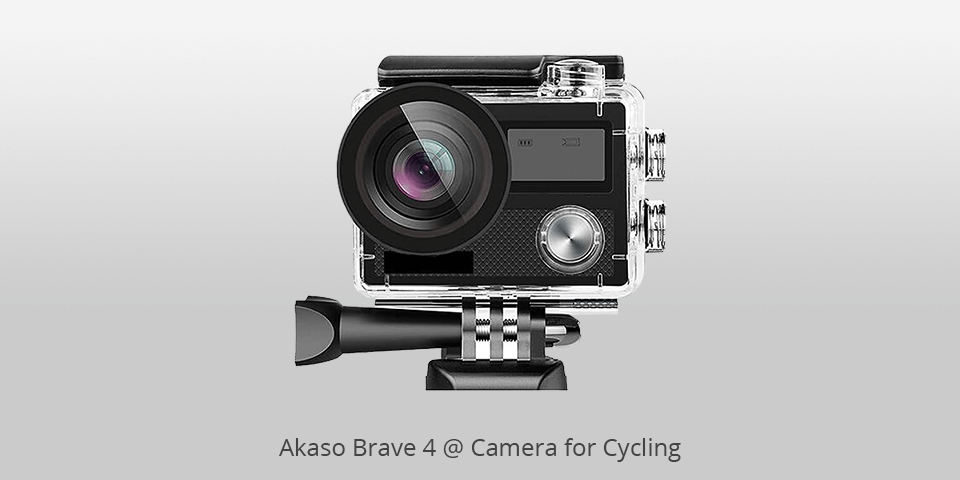
Max video resolution: 4K/30fps | Stabilization: Built-in electronic image stabilization | Battery life: 1080P/About 90 mins, 4K/2K/About 60 mins | Dimensions: 2.32 x 1.57 x 0.91 inches | Weight: 5.6 ounces
Being the cheapest in this list of best cycling cameras, Akaso Brave 4 is practically in no way inferior to its analogs in terms of functionality. This action camera under 100 dollars boasts many shooting modes that you can customize, sharp footage, and excellent resolution - 4K at 24 FPS and 2K resolution at 30 FPS. Slightly lower frames per second at 4K than its counterparts do not prevent it from delighting you with impressive sound and picture quality.
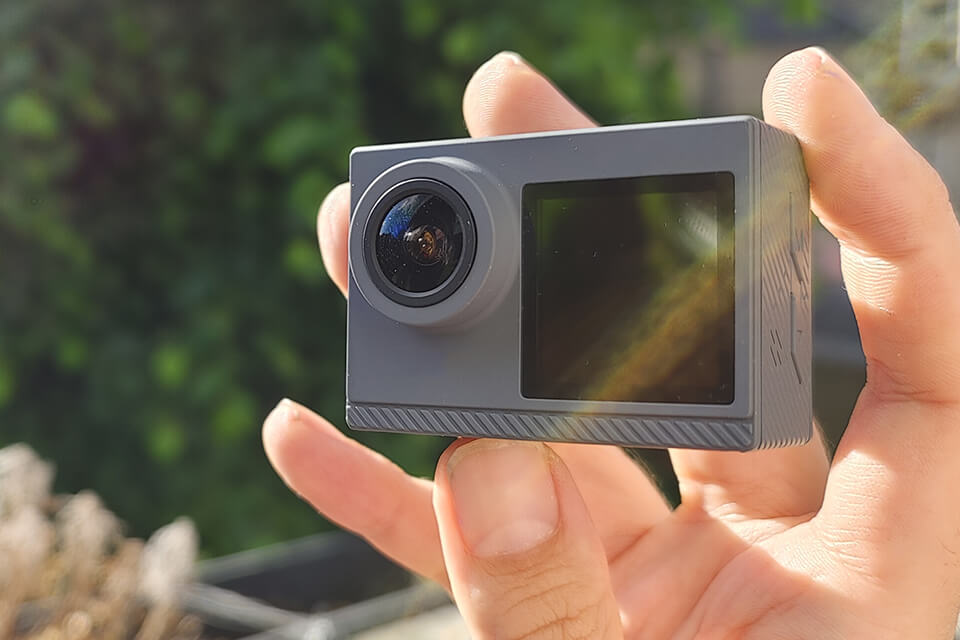
The Akaso Brave is very light and small – it fits easily in the palm of your hand and weighs only 5.6 ounces. This gives you the freedom to mount it – handlebar or helmet – while the package will include all the mounts and accessories you need. However, the highlight of this model is its battery life, namely 60 – 90 minutes for each of the two included batteries, which is enough for your scenic rides.
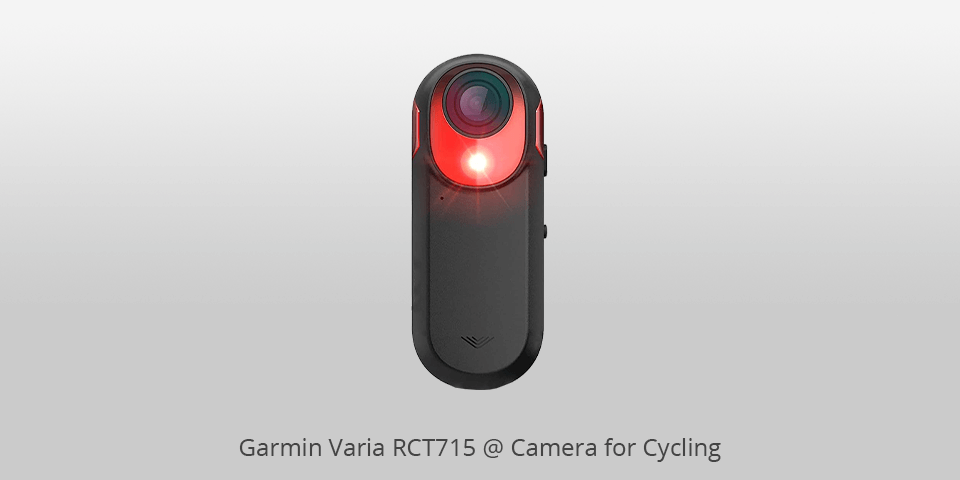
Max video resolution: Full HD 30p | Stabilization: - | Battery life: 4-6 hours | Dimensions: 106.5 x 42.0 x 31.9 mm | Weight: 147 g
The Garmin Varia RCT715 brings something completely new to the camera for biking – a rearview radar. This is an incredibly useful feature that monitors the situation behind the driver and notifies him both visually and with the help of audio notifications about objects within a radius of 140 meters.
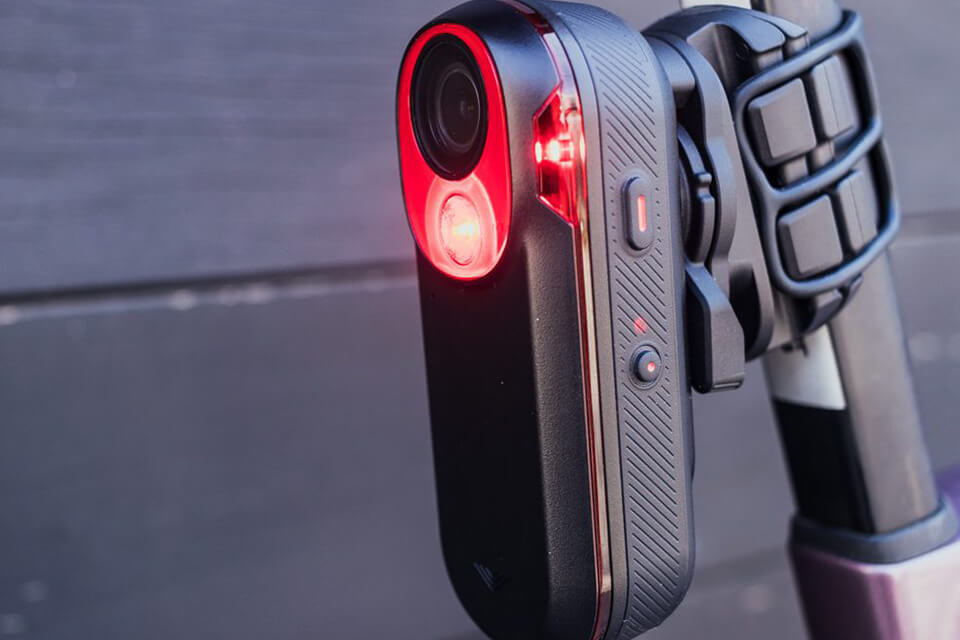
As for the battery life of this GoPro alternative, it reaches 4-6 hours when using this rear radar. At the same time, image performance is also not affected – the camera offers amazing quality in Full HD. The only thing that the developers have not worked out well is a mobile application with a complex search engine for footage.
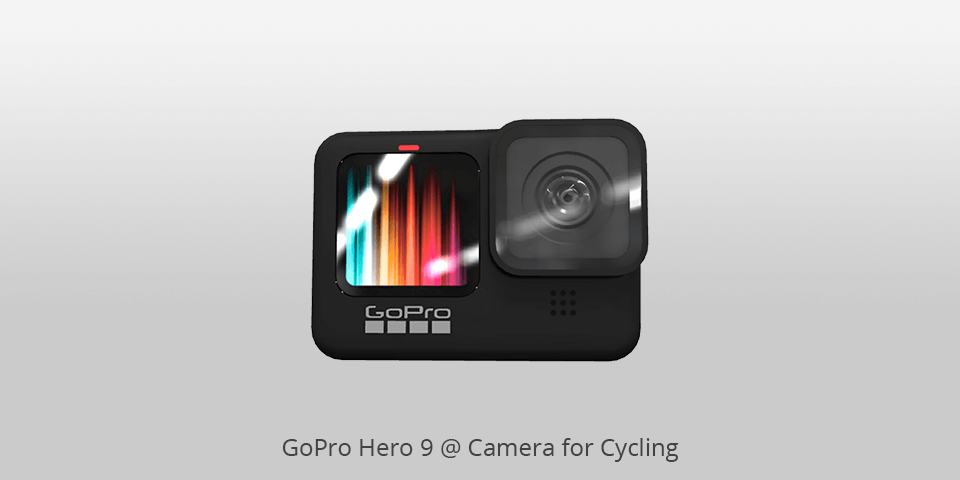
Max video resolution: 5k/30fps | Stabilization: Electronic | Battery life: Up to 1 hour 40 minutes | Dimensions: 71mm x 55mm x 34mm | Weight: 160g
The GoPro Hero 9 Black is the previous version of the Hero 10, also featured in this best cycling cameras list. Obviously, its functionality is somewhat less than that of 10 (for example, HyperSmooth 3.0 instead of 4.0), but the high quality of the frames and the amazing stabilization capabilities required by cyclists are also at their best here. As for photos, the 20MP resolution is more than enough for pro-level capturing, and the SuperPhoto function will help you choose the most appropriate kind of picture editing.
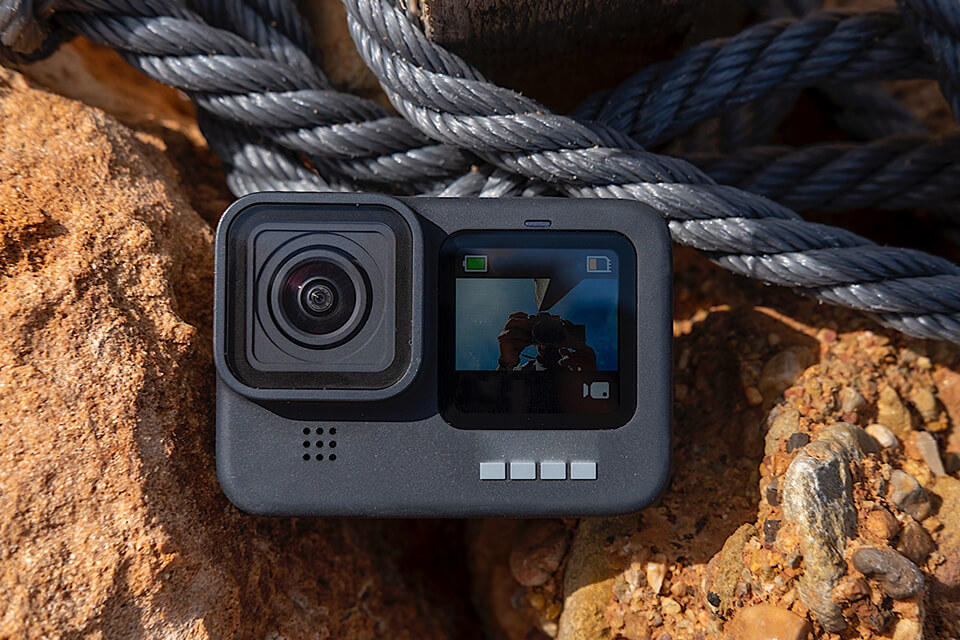
Being almost identical to the Hero 10 in terms of design (weight, size, layout), the Hero 9 is still inferior to it in screen responsiveness and navigation performance, which can slightly spoil the user experience. The battery lasts for a long time, which can not but rejoice. More specifically, I filmed for three hours in 1080p, and only after that, the device ran out of power.
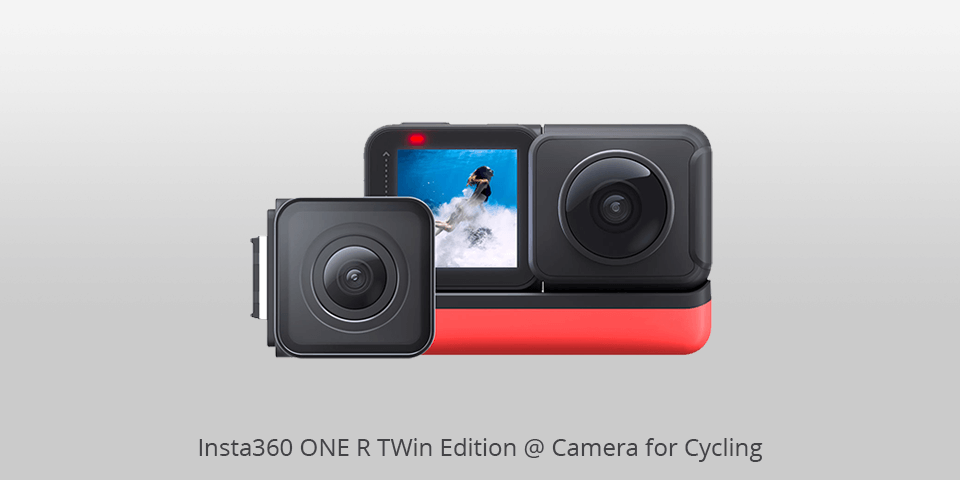
Max video resolution: 5.7K 30p | Stabilization: FlowState | Battery life: 1190mAh | Dimensions: 1.89 x 1.69 x 2.83 inches | Weight: 6.1 ounces
This cycle camera is a smart modular system with multi-lens interchange available. Therefore, you can install a 4K module and a 360-degree module according to the circumstances. The device is also equipped with a 1-inch sensor, which is much larger than in other similar cameras. This increases the dynamic range and greatly affects the quality of the recording.
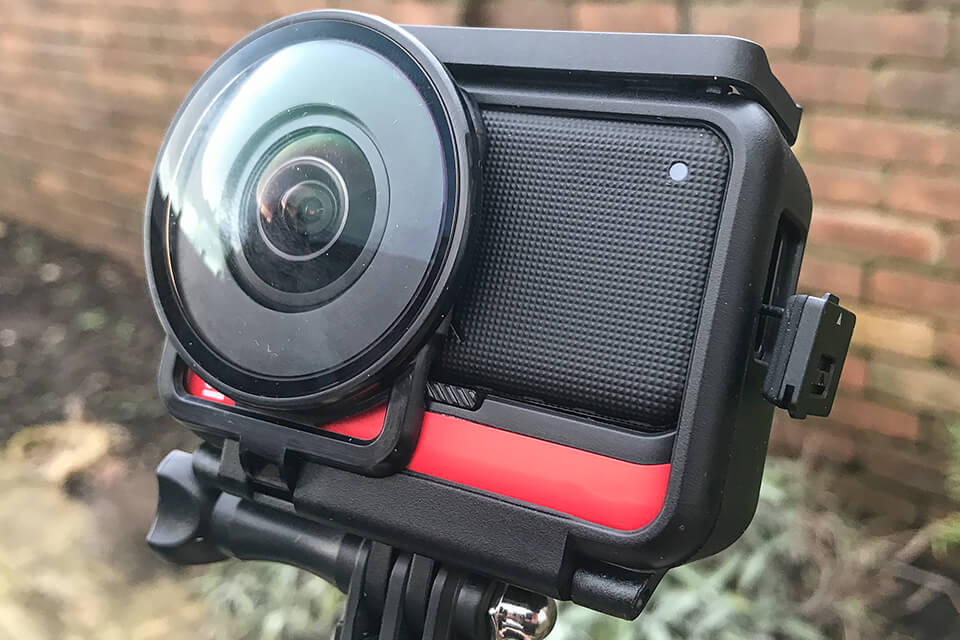
All this makes this model quite expensive, but it’s worth it. In addition to all the advantages described above, you can order individual bike mounts as a kit to make the installation process easier.
| IMAGE | NAME | FEATURES | |
|---|---|---|---|

|
GoPro Hero 10
5K QUALITY
|
CHECK PRICE → | |

|
DJI Action 2
BEST IS
|
CHECK PRICE → | |

|
Insta360 Go 2
MODULAR
|
CHECK PRICE → |
Modern action cameras are full-featured and super-technological tiny devices that are ready to be installed on almost any surface, capable of impressing with their high quality and stability of the captured frames, as well as sharing these frames immediately on your social networks. Before buying such a device, it is important to understand what your best camera for cycling is. A variety of functions and features available in new models greatly complicate such a choice.
Perhaps the most important parameter when choosing an action camera is the resolution, which directly affects the quality of videos and photos. To keep your footage as clear and detailed as possible, pay attention to pixel values. Full HD 1080p will be the best value for shooting video, but if you are after the best performance, then take a closer look at models with 4K. It is important to understand here that such frames will take up more storage space, so make sure that it is sufficient or that the device comes with a large cloud account.
If you plan to shoot frequently in slow-mo, then choose a model with high fps settings. Frames filmed at 240 fps, for example, can be slowed down by 8 times without losing quality. More affordable options offer a hassle-free slowdown of at least 2 times.
Of course, optical stabilization would be the best option, but an electronic one such as HyperSmooth is an equally effective alternative. Most modern models are already equipped with optical stabilization, freeing your footage from judder and jumps. However, you should be aware that such features, which can make your video smooth, increase the cost of devices.
Changing the battery on the go or charging from a bike is of course impossible, so make sure you have a reliable and long-lasting battery for your cycle camera. Ensure it will work for several hours of continuous shooting. A spare battery or power banks are also a good idea.
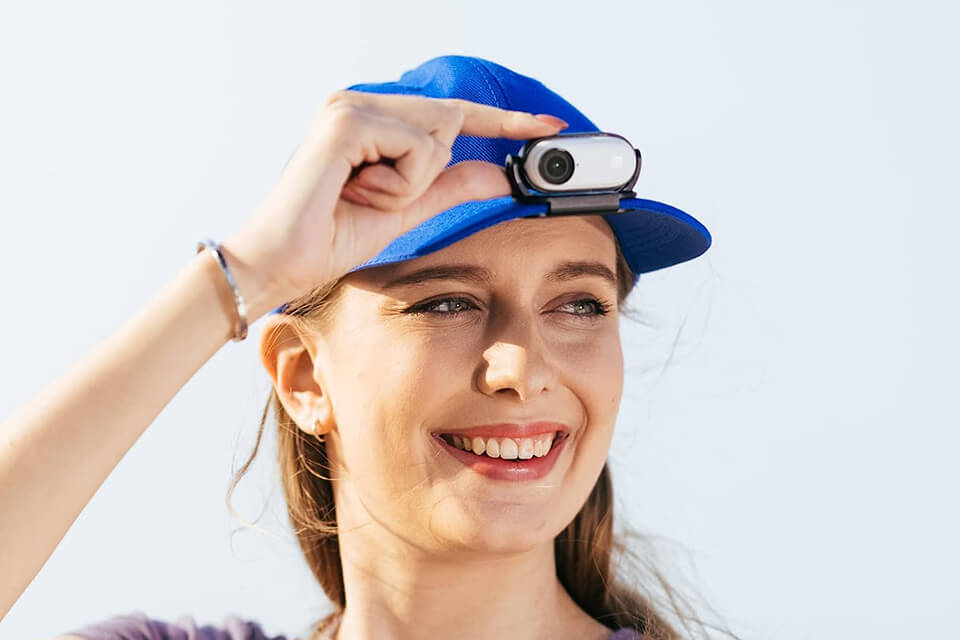
For the camera to be securely attached to your helmet or handlebar, you should also take care of the proper mounts. Some kits already come with these mounts. Otherwise, you should buy them separately. In this case, make sure that their specifications and dimensions match.
There is no one-size-fits-all camera mounting location, as it all depends on your purpose of shooting. However, the best ways to mount action camera is to mount it under the saddle or on the handlebars. If you don’t have enough free space for the camera in front of you, then try mounting it upside down – it won’t ruin your footage. If you want to record scenery in front of you, then it is better to mount the camera in front, and if you are traveling with a group of friends and want to capture their emotions, then it makes sense to install it in the back.
This is entirely your choice depending on your preferences and situations. Of course, 4K and 5K are ultra-high-quality shooting that will give you incredibly sharp footage. This can also be said about UHD. However, you should be aware that this is too energy intensive. If you are planning a long adventure and want to capture as much as possible, then go for FHD and HD. These options also boast decent quality but are more economical in terms of energy consumption.
The best cycling cameras and other action cameras have been designed with sports requirements in mind. Their assembly is strong, the size is compact, and the weight is quite small. They usually come with slow-mo features, high fps, and wide viewing angles. These devices are easy to control so that it does not distract from the ride, they often come with full voice control. The rugged and classic cameras are more delicate and have bigger assemblies that are unlikely to withstand the rigors of use.